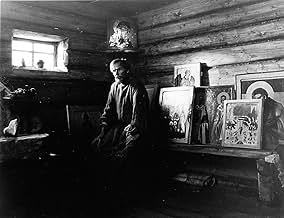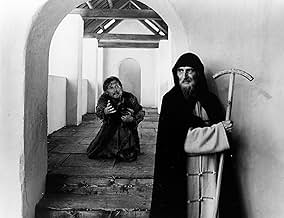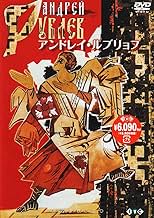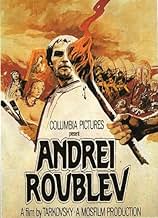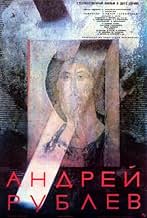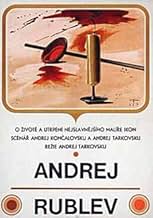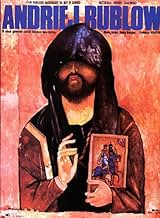Andrej Rublëv narra la vita del grande pittore di icone vissuto in Russia nel turbolento XV° secolo, epoca marcata da sanguinosi conflitti tra pincipi rivali e dalla terribile invasione dei ... Leggi tuttoAndrej Rublëv narra la vita del grande pittore di icone vissuto in Russia nel turbolento XV° secolo, epoca marcata da sanguinosi conflitti tra pincipi rivali e dalla terribile invasione dei Tartari.Andrej Rublëv narra la vita del grande pittore di icone vissuto in Russia nel turbolento XV° secolo, epoca marcata da sanguinosi conflitti tra pincipi rivali e dalla terribile invasione dei Tartari.
- Regia
- Sceneggiatura
- Star
- Premi
- 4 vittorie e 1 candidatura in totale
- Durochka
- (as Irma Raush)
- Patrikey, monakh
- (as Yu. Nikulin)
- Skomorokh
- (as R. Bykov)
- Stepan, sotnik Velikogo knyazya
- (as N. Grabbe)
- Foma, monakh
- (as M. Kononov)
- Starshiy liteyshchik
- (as S. Krylov)
- Tatarskiy khan
- (as B. Beyshenaliev)
- Aleksey, monakh
- (as A. Obukhov)
- Sergey
- (as Volodya Titov)
- Efim
- (as N. Glazkov)
Recensioni in evidenza
There are no cliches here, no stereotypes and no sucking up to the audience. A brutally honest and yet very moving, touching and optimistic film. And it is not about the nature of a genius. Rather, it is about a man's ability and duty to preserve and be true to his humanity, his freedom, his soul, his heart and his gift, no matter what century it is or what the circumstances are. Watch it to remind yourself of what it really means to be human.
A bit difficult to review this movie. It is clearly the work of a master craftsman: the exquisite cinematography, the sheer scale of the subject matter and time period, the themes, the obvious adoration director Andrei Tarkovsky has for his subject.
Yet it is often quite a grind to watch: clocks in at well over 3 hours and moves very slowly. Several scenes will go by without development in plot or theme. Furthermore, the separate time periods don't necessarily form a narrative. They often just feel like things happening, with no connection between them.
While acknowledging that the film is well made, I fail to see how it is so highly regarded. I did not come away feeling that I had just watched a masterpiece, something incredibly profound or moving.
Andrei Rublev was a medieval Russian iconographer; the film chronicles his struggle to maintain faith and artistry in a world of immeasurable cruelty and suffering. Rather than give us a crackerjack plot line with all the proper scene climaxes & paradigm shifts, director Tarkovsky presents us with a world in which we must immerse ourselves; once we are inside, we are confronted with rigorous pain and profound triumph. The movie is divided into chapters; the final one, involving an orphaned bell-maker's son, is a stunning film-within-a-film that provides a microcosm of the whole movie. That section, if it stood alone, would be my all-time favourite film.
Be warned: "Andrei Rublev" is SLOW. You have to slide into it; it's not a flick which dazzles, it is a world which beguiles, and which demands to be inhabited. Also, there are EXTREMELY difficult scenes to watch--torture and bloodshed abounds. Watching the Tartar attack on a Russian town is the most painful experience I've ever had--not just in a cinema, but in life.
For those willing to make the gruelling trek, however, "Andrei Rublev" is an inspiring, life-affecting experience. Created under an oppressive Soviet regime (which banned the film for years, recognizing its symbolic commentary on 20th-century Soviet government), the film shows how life can be valuable and even joyful, no matter how much suffering stands in the way.
Especially recommended for Tarkovsky fans, Dostoevsky fans, fans of medieval art, and anyone grappling with questions about suffering and human expression.
Tarkovsky wanted to make art that would change people's lives and in this he succeeded. Although his life was troubled and his projects clawed into life randomly from the grip of his film studio bosses, when viewed as a whole they seem to be all part of some great plan that was meant to reach fruition right from the start. He believed that ultimately it is best to do things that deepen one's inner life rather than impoverish it. That may explain why you leave most Hollywood films feeling soiled. There are too many great scenes and moments in this astonishing and monumental work to mention so I won't. Suffice it to say it would have been fascinating to have seen what Tarkovsky would have made had he lived and returned from exile to his homeland. Recent events in Russia and the Balkans make this film even more vital and pertinent today.
The trouble is Tarkovsky's films have such extraordinary purity and spiritual depth that no other films seem able to satisfy one in the same way. They seem flat, lifeless and unable to compete. Why watch the let's-pretend-grown ups like Tarantino when you can watch a real grown up? So like I said, Bloody Tarkovsky. He has ruined cinema for me.
Lo sapevi?
- QuizFilm debut of Anatoliy Solonitsyn, and the first of four movies he made together with director Andrei Tarkovsky before his death from cancer in 1982. Had Solonitsyn lived, he would also have played protagonist Andrei Gorchakov in Tarkovsky's Nostalghia (1983), as well as star in a project titled 'The Witch' which eventually became Tarkovsky's final production, Sacrificio (1986).
- BlooperThe smoothly-cut logs that feature many times in the early scenes are clearly cut with machinery not available in the early fifteenth century.
- Citazioni
Andrei Rublyov: You just spoke of Jesus. Perhaps he was born and crucified to reconcile God and man. Jesus came from God, so he is all-powerful. And if He died on the cross it was predetermined and His crucifixion and death were God's will. That would have aroused hatred not in those that crucified him but in those that loved him if they had been near him at that moment, because they loved him as a man only. But if He, of His own will, left them, He displayed injustice, or even cruelty. Maybe those who crucified him loved him because they helped in this divine plan.
- Versioni alternativeSoviet television created a severely trimmed 101-minute version that the director did not authorize. Notable scenes removed from this version were the raid of the Tatars and the scene showing naked pagans. The epilogue showing details of Andrei Rublev's icons was in black and white as the Soviet Union had not yet fully transitioned to color TV.
- ConnessioniEdited into Ombres vives ...une autre histoire du cinema... (2013)
I più visti
- How long is Andrei Rublev?Powered by Alexa
Dettagli
- Data di uscita
- Paese di origine
- Lingue
- Celebre anche come
- Andrej Rubliov
- Luoghi delle riprese
- Aziende produttrici
- Vedi altri crediti dell’azienda su IMDbPro
Botteghino
- Budget
- 1.000.000 RUR (previsto)
- Lordo Stati Uniti e Canada
- 124.189 USD
- Fine settimana di apertura Stati Uniti e Canada
- 11.537 USD
- 15 set 2002
- Lordo in tutto il mondo
- 180.956 USD
- Tempo di esecuzione
- 3h 9min(189 min)
- Colore
- Mix di suoni
- Proporzioni
- 2.35 : 1


